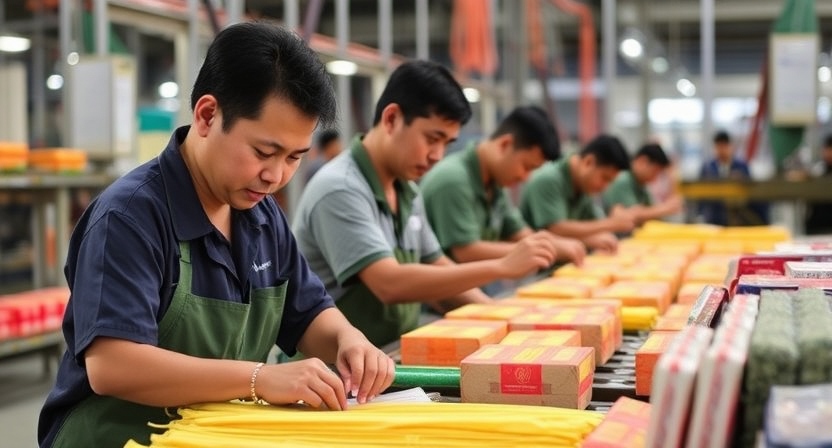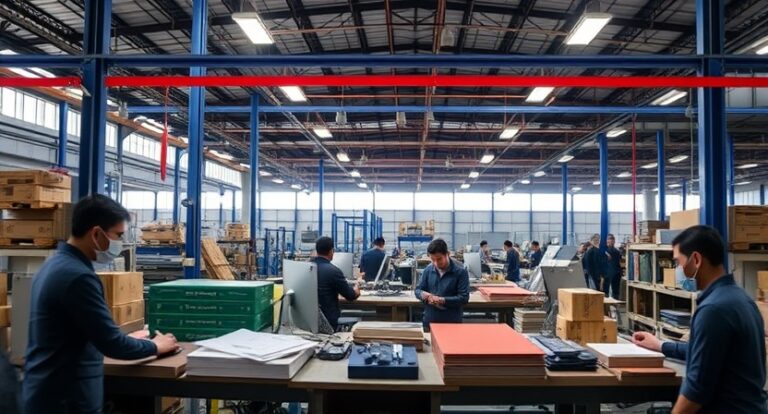Cambodia is fast becoming one of the most attractive destinations for global manufacturing, driven by competitive labor costs, growing industrial capabilities, and an improving business environment. The country’s manufacturing sector is gaining momentum across various industries, including textiles, footwear, electronics, and food processing. As Cambodia positions itself as a key player in the global supply chain, both local and foreign businesses are increasingly looking to tap into its growing manufacturing potential. In this blog, we explore the trends driving Cambodia’s manufacturing industry and provide insights into how companies can benefit from its growth, especially with the help of a skilled Asia agent
The Rise of Cambodia’s Manufacturing Industry
Cambodia’s manufacturing industry has witnessed remarkable growth over the past decade. The sector’s rapid expansion is largely attributed to the country’s competitive advantages, such as low labor costs, a youthful workforce, and favorable trade agreements. Additionally, Cambodia’s strategic location in Southeast Asia, combined with improved infrastructure, has enhanced its appeal as a manufacturing hub for companies seeking to diversify their supply chains.Key Drivers of Cambodia’s Manufacturing Growth
- Competitive Labor Costs Cambodia’s labor costs are among the lowest in Southeast Asia, making it an attractive option for labor-intensive industries. This affordability gives businesses the ability to lower production costs, especially in sectors like textiles, footwear, and garment manufacturing, where labor plays a key role. Companies looking to source or outsource manufacturing can take advantage of Cambodia’s cost-effective labor force.
- Young and Growing Workforce With a population of over 16 million, Cambodia boasts a large, youthful workforce. The country’s median age is just 25 years old, offering a significant pool of young, energetic workers who are eager to enter the manufacturing sector. With increasing investments in vocational training and education, Cambodia is steadily developing a skilled workforce capable of meeting the demands of modern manufacturing processes.
- Improving Infrastructure Cambodia has invested heavily in infrastructure, including the development of industrial parks, roads, ports, and logistics networks. The Phnom Penh Special Economic Zone (PPSEZ) and the Sihanoukville Port are two examples of key infrastructure that make Cambodia an attractive place for foreign businesses looking to establish manufacturing operations.
Key Sectors Fueling Cambodia’s Manufacturing Growth
Several key sectors are driving Cambodia’s manufacturing expansion. These industries not only create significant employment opportunities but also contribute heavily to the country’s export economy.1. Garments and Textiles
Cambodia is one of the world’s top exporters of garments, primarily due to its low labor costs and the preference for quick-turnaround production. The country is home to several international brands, which source a variety of products, from clothing to accessories, in Cambodia’s factories. The sector benefits from preferential trade agreements, such as the European Union’s Everything But Arms (EBA) initiative, which provides duty-free access for Cambodian exports to European markets.2. Footwear Manufacturing
In addition to garments, Cambodia has emerged as a significant player in the global footwear industry. Major brands rely on Cambodian manufacturers for the production of shoes at competitive prices. The country’s growing expertise in footwear manufacturing has helped it gain market share in both high-end and budget footwear markets.3. Electronics and Electrical Equipment
Cambodia is also making strides in electronics manufacturing, with an increasing number of multinational companies setting up operations in the country. The electronics sector is growing due to Cambodia’s low labor costs, proximity to major Asian markets, and an improving workforce skilled in assembling components like circuit boards, electronic devices, and other electrical equipment.4. Food and Beverage Processing
The food and beverage sector is another key industry that is benefiting from Cambodia’s manufacturing potential. Companies in the agriculture and food processing industries are establishing production plants, driven by the country’s rich agricultural resources. Cambodia’s growing export market for processed foods and beverages makes it a key player in the global food supply chain.How an Asia Agent Can Help Unlock Cambodia’s Manufacturing Potential
As businesses explore the manufacturing opportunities in Cambodia, working with an experienced Asia agent can provide valuable support in navigating the complexities of the local market. A reliable Asia agent acts as a guide, helping companies streamline their operations and optimize supply chains in Cambodia.Key Roles of an Asia Agent in Cambodia:
- Supplier Identification and Relationship Management A local Asia agent can assist companies in identifying the right suppliers, manufacturers, and service providers in Cambodia. They act as intermediaries, helping businesses establish relationships with local partners and ensuring that the suppliers meet international standards for quality and reliability.
- Quality Control and Inspection Ensuring product quality is essential for companies entering Cambodia’s manufacturing sector. An Asia agent can assist with quality control processes by conducting factory audits, monitoring production, and performing inspections to ensure that products meet both local and international quality standards.
- Logistics and Supply Chain Management Navigating Cambodia’s logistics and transportation systems can be a challenge for foreign companies. An Asia agent can help manage logistics, ensuring timely deliveries and smooth customs procedures. With their local expertise, these agents ensure that shipments are processed efficiently, reducing delays and costs.
- Regulatory and Compliance Support Cambodia’s business environment can be complex, particularly for foreign businesses unfamiliar with local regulations. A knowledgeable Asia agent can provide guidance on compliance with Cambodia’s legal and regulatory requirements, such as labor laws, import/export regulations, and environmental standards. This ensures businesses stay compliant and avoid any potential legal issues.
- Market Insights and Risk Management An Asia agent can offer valuable market insights, helping businesses understand emerging trends in Cambodia’s manufacturing sector. By assessing risks, potential obstacles, and market opportunities, these agents provide critical information that enables companies to make informed decisions when setting up operations in Cambodia.
Challenges and Considerations in Cambodia’s Manufacturing Landscape
While Cambodia offers many opportunities for manufacturers, there are also challenges to consider:- Skills Gap in Certain Sectors While Cambodia’s labor force is growing, certain manufacturing sectors, particularly high-tech industries, face challenges related to skill gaps. However, the Cambodian government is making strides to invest in vocational training and education, which will help address these issues in the long term.
- Infrastructure Limitations Though Cambodia’s infrastructure has improved, challenges still exist, particularly in remote areas. Businesses should carefully assess logistics and transportation capabilities to ensure efficient operations.
- Regulatory Environment While Cambodia has made progress in improving its business environment, navigating local regulations can still be complex for foreign companies. Partnering with an Asia agent who understands the local regulatory landscape can significantly ease this process.

